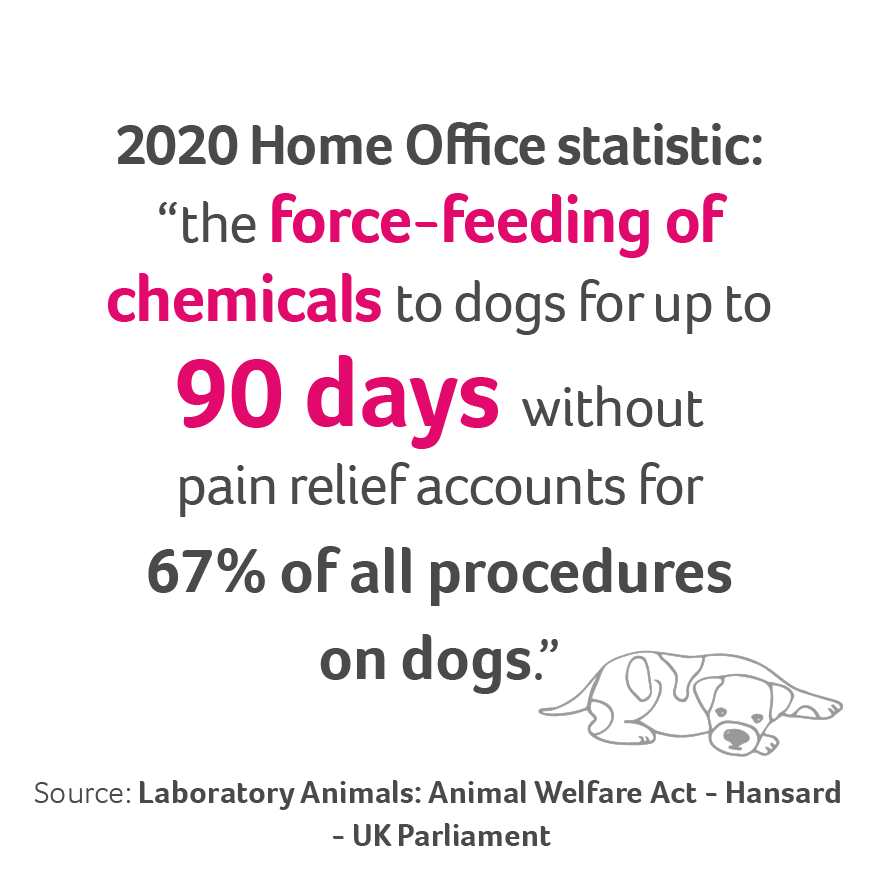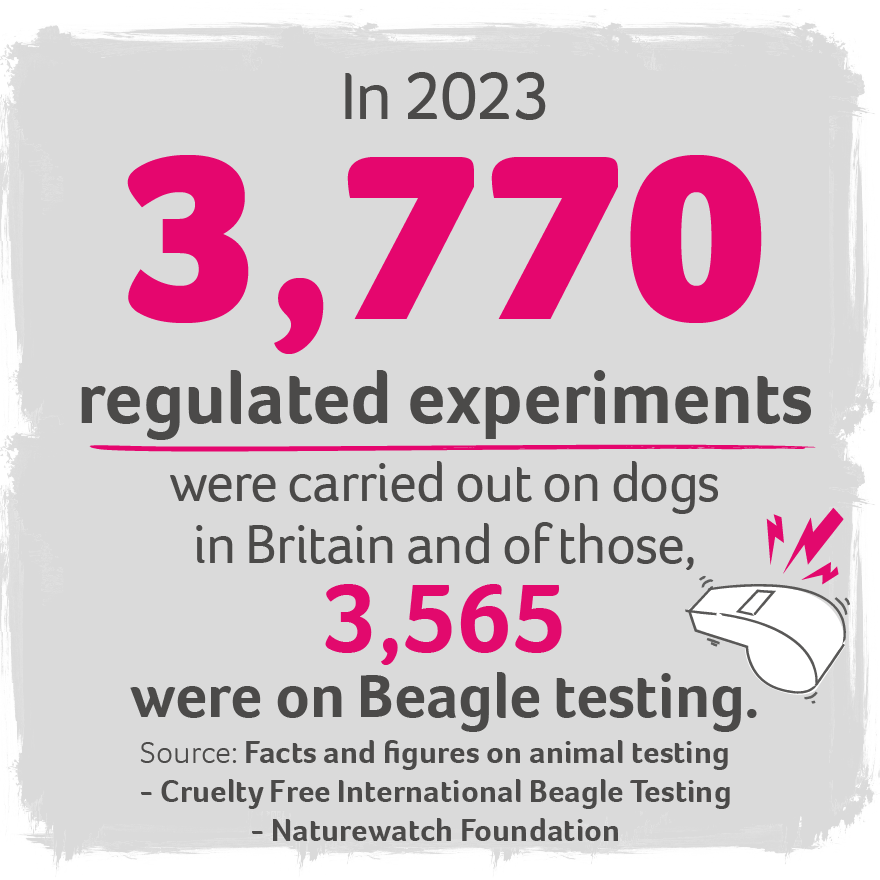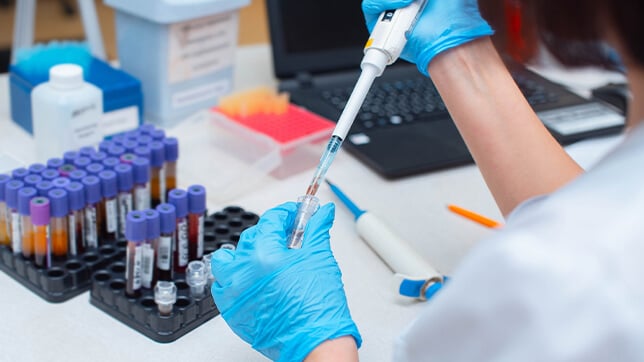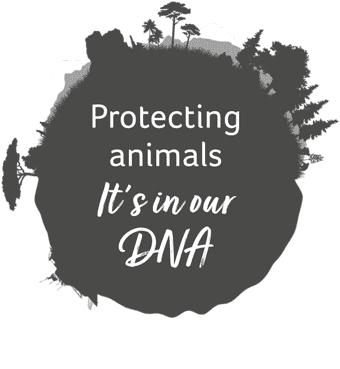What can happen inside these laboratories?
Beagles are taken for testing when they are still puppies. Some dogs bred for testing are forced to inhale pesticides or have been deliberately given heart attacks, others have been injected or force-fed poisonous chemicals. If the intended result of a heart attack is not met, asphyxiation is conducted before an autopsy is carried out so that the effects can be assessed.2
With advanced, innovative technology coming to the fore, some of the procedures that inflict the most pain and suffering on animals such as beagles can now be simulated artificially through computer modelling, non-invasive scanning methods and cell cultures. XCellR8 is a UK-based laboratory with the aim of accelerating 100% animal-free testing through their work and already have success teaming up with brands such as Lush and The Body Shop.3 This gives us hope that one day no animal will have to experience a life of suffering.
The idea that animals still suffer through medical research in the UK seems difficult to comprehend, but this is unfortunately the case.


Why are beagles used in animal testing?
Beagles are the preferred choice for laboratories because of their sweet, gentle, people-pleasing personalities. As part of their breed, they are docile and forgiving by nature and as such, less likely to be aggressive or fight back. The breed size also means that they fit more easily into a cage or kennel.
The sad truth is that the very reason they make such great pets and people love them, is the reason they are exploited.
The consequence of industrial puppy breeding in the UK
Marshall BioResources (MBR) Acres is a beagle breeding facility in Cambridgeshire where dogs are bred with the sole purpose of being sold on to animal testing laboratories in the UK and Ireland.
MBR Acres continues to breed and keep up to 2,000 beagles each year.5 6
It is highly unlikely that any of these beagles will ever see life outside of the grounds of this laboratory, and while the goal is to urge investment into non-animal methods of medical research, concurrently we want to help bring in better living conditions and care for those that remain part of the animal testing system.
We are also highlighting the desperate need for the ‘rehabilitation and rehoming after release’ scheme be progressed, made fit for purpose, and adopted into legislation so that animals have the chance to experience love and care in their forever home. Current legislation means that animals are often euthanised after testing, but we believe that more efforts should be made to rehabilitate these animals to help them find a new and better life.
A ‘rehabilitation and rehoming after release’ scheme would provide training and health checks to each beagle on release, giving them the best preparation for the outside world. New owners would also receive continued support to ensure any new addition to the family settles in as smoothly and comfortably as possible.

Keeping secrets
The Animals (Scientific Procedures) Act, 1986 (ASPA), which regulates the conditions under which animal testing can occur in the UK, gives an impenetrable degree of protection for these facilities.
The ‘Secrecy Clause’ within Section 24, means that anyone who discloses information considered confidential about animal experiments could face up to two years in prison.
Data on the number of experiments carried out by type and breed can be accessed, but that is as detailed as it gets. This prevents the sharing of licensing assessments, the content of licensing applications, inspector visit reports, and review papers, resulting in very little insight into what the animals endure in these facilities.
A government consultation in 2014 led to an active review of Section 24 with the promise to pursue legal change, however as of March 2025, no results have been published.
In January 2023, a petition signed by over 100,000 people was debated in Parliament in relation to reviewing the secrecy clause.
During the debate it was revealed that in 2021 there were over 3 million procedures carried out on animals, but the number of animal laboratory inspectors remains very low, with just 23 full-time equivalents to oversee it all.7
So, what happened since the 2023 debate in Parliament?
The debate helped to raise awareness of several issues, such as clear reporting, evidence of animal welfare standards, and the plight of the animal once testing is finished. Many are euthanised to help facilitate the test result analysis process, and although testing facilities are expected to attempt to rehome animals after experiments, the figures for rehoming are unavailable.
There have been many petitions in relation to banning the use of dogs for scientific testing since this debate. In September 2024, the government asked Lord Patrick Vallance, Minister of State for Science, Research and Innovation, to lead the development of a roadmap to phase out animal testing in the UK.
While this is a big step forward, it will not be a quick fix. The roadmap for a transition to non-animal methods will take many years but with the right investment and commitment from the government we can begin moving towards ending animal testing for good.
Both the philosophy and merit of some animal testing has been raised in the scientific sector8, where evidence has revealed that certain research projects carried out on animals often fail to be successful in human trials.9 The University of Oxford has demonstrated success in Non-Animal Method (NAM) testing by replicating the human blood-brain barrier and mimicking strokes, opening up new possibilities to test stroke drugs in human cells.10
Unfortunately, the ongoing development of NAM testing has been slow due to current regulation issues and lack of funding. In a positive step, grant schemes were established in 202211 and again in 202412 to support the next generation of non-animal technologies through research and innovation particularly across UK industry but also globally. A great start, but more government funding and support is needed to continue this research and enhance scientific confidence in NAM testing.
This is where you can help!
We need your support to ensure the government pursues the recommended amendments to the secrecy clause, progresses the ‘rehabilitation and rehoming after release’ scheme, and invests funds and research into Non-Animal Method testing.
By pushing for funding and research into Non-Animal Method testing, we can help to ensure the UK is positioned as a world-leader in successful, cruelty-free laboratory experiments.
Ways to take action
Write to your MP requesting they:
- Progress the ‘rehabilitation and rehoming after release’ scheme.
- Ensure that the government retains its commitment to create a roadmap to phase-out animal testing.
- Pursue the recommended amendments to the secrecy clause.
- Invest funds and research into Non-Animal Method testing.
- Improve living conditions for animals in testing laboratories.
- Increase the number of independent inspectors responsible for overseeing animal laboratory standards.
- Look for the leaping bunny! Always check labels on your cosmetics and household products to make sure they are cruelty-free. Join half a million others using the app Cruelty-Cutter – it’s free and easy to use.
- Beagle Testing | Naturewatch Foundation
- Commercial Breeding for Laboratories - Hansard - UK Parliament
- About XCellR8 | XCellR8
- Laboratory Animals: Animal Welfare Act - Hansard - UK Parliament
- FREE “OLD BOY” FROM MBR ACRES – Beagle Freedom Project UK
- Footage of beagles bred for lab tests shows puppies ‘stressed and confined in cages’ | The Independent
- https://www.youtube.com/watch?v=uxKsiDQ0rAU
- Animal research essay resources :: Understanding Animal Research
- 757544 - British Medical Journal, Volume 348-June 2014.
- Final Report: Dr Paul Holloway – Developing human mini-brain circuits to reveal new insights into stroke - Animal Free Research UK
- Next generation of non-animal technologies – UKRI
- Non-animal methods infrastructure grants | NC3Rs
Want to hear more?
If you would like to hear more about how Animal Friends makes a difference to the lives of vulnerable pets and wildlife everywhere, sign up below and receive regular charity news into your inbox.

